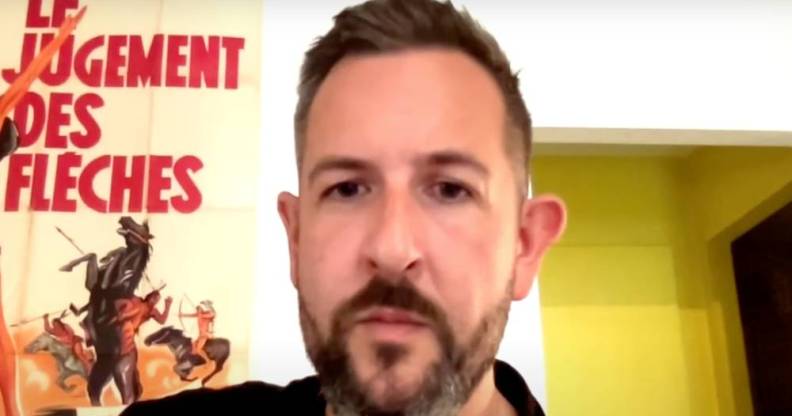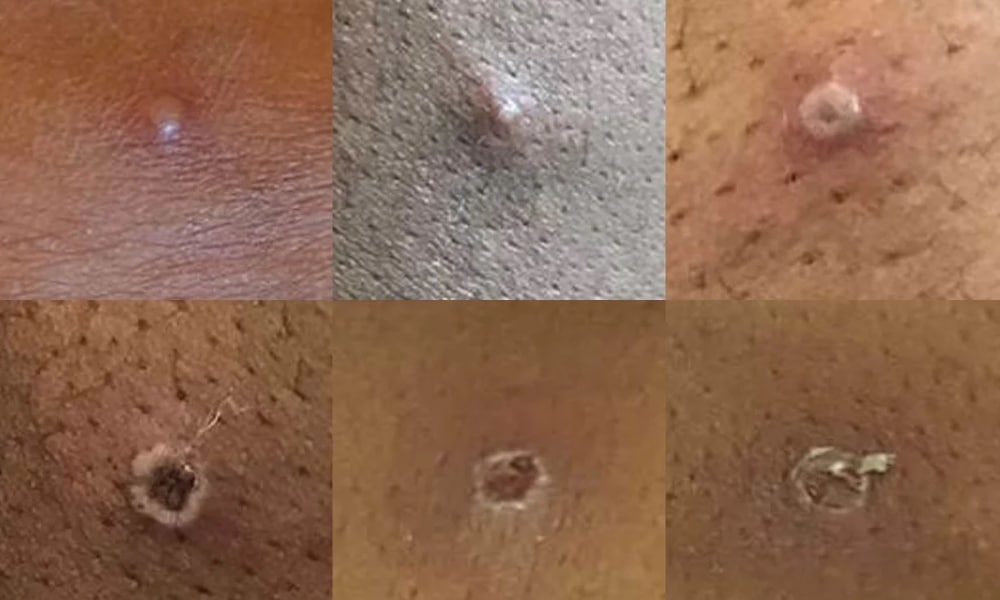UK’s ‘first monkeypox patient to go public’ slams ‘farcical’ health officials tackling virus

James McFadzean, who is the first British monkeypox patient to be publicly interviewed, criticised the body responsible for tracking and tracing the virus. (YouTube/TalkTV)
James McFadzean, who is described as the UK’s ‘first monkeypox patient to go public’ with his diagnosis, has slammed the “farcical” response by the body responsible for tracking the virus.
McFadzean, who is from London, claimed in an interview with MailOnline that it took almost two weeks for contact tracers at UK Health Security Agency (UKHSA) to reach out to him.
He told the outlet that he had just come back to the UK after living in Dubai for four years following a “shock” HIV diagnosis in February, which resulted in him losing his job and home. When he returned to the UK, McFadzean said he was experiencing “really weird aches” in his lower back, exhaustion, extreme thirst and pain when he used the restroom.
But he was convinced it might be a sexually transmitted infection as he slept with around 10 new partners in the weeks before his symptoms emerged. He told the outlet that he was sent for tests to a specialist centre in London on 25 May.
When he got to the clinic, McFadzean said he was told workers were going to “put on PPE” and told him “not to touch door handles”.
“The whole experience kind of heightens your sense of, ‘Oh this must be really serious,’” he recalled. “I remember going to COVID centres, and it wasn’t as daunting or overwhelming as this.”
At the time, a few people had been diagnosed with monkeypox after the UK confirmed to the World Health Organization on 13 May that it had two laboratory-confirmed cases of the virus.
But McFadzean alleged that he was told that he didn’t have the contagious disease as he didn’t have any of its hallmark physical symptoms like a rash, lumps or lesions. The NHS does note that the first symptoms of monkeypox include: a high temperature, headache, muscle aches, backache, swollen glands, shivering and exhaustion.

The stages of monkeypox. (UK Health Security Agency)
Just three days later, on 28 May, McFadzean said a PCR test confirmed he had monkeypox, and he received a letter sent by Chelsea and Westminster NHS Foundation Trust instructing him to “stay in isolation at home until further review” by UKHSA.
Yet, McFadzean claimed that UKHSA hadn’t been in contact with him in the days since his diagnosis. He said in an interview with TalkTV Tuesday (7 June) that the government agency didn’t reach out to him until he spoke to the press.
“Funnily enough, [the UKHSA did not contact me] until 10 minutes ago after my story broke all of the sudden they found my right phone number which seems farcical because every day I’ve been calling my clinic, the NHS trust, trying to get someone to get people to call me so we can do contact tracing, so we can identify other people at risk,” he said.
McFadzean admitted that he was “annoyed” by the UKHSA’s lack of response given that the world just went through the COVID-19 pandemic, which required contract tracking and tracing. He said the viruses were different but thought the “infrastructure” must be there to track the spread of monkeypox, which has rapidly spread across the UK and the world.
“As I said 50, 60 people at the time I felt unwell – how many people does it take to call that many people? Two people in a call centre?” he said.
"All of a sudden they found my right phone number."
In a broadcast exclusive, James McFadzean, the first UK Monkeypox victim to go public, says the UK Health Security Agency only got in touch with him 10 minutes before his interview.@tnewtondunn pic.twitter.com/krjJreKP9H
— First Edition (@FirstEdition) June 7, 2022
Dr J Yimmy Chow, a consultant in communicable disease control at the UKHSA, told MailOnline that the government body had made “multiple attempts” to reach McFadzean by phone and email.
McFadzean said it was “untrue” as he hadn’t received any communication from UKHSA. He told TalkTV he wanted UKHSA to “just own the mistake”, say they are “getting on it” and to “do better”.
McFadzean told MailOnline that it felt like a “kick in the teeth to have experienced this treatment” as the UK is “supposed to be safe and have world-leading healthcare”.
“Even though there were only 80ish people with it in the UK when I was diagnosed, there was just a real lack of any basic process or care to try and stop the spread,” he said.
“It’s frustrating coming out of COVID and seeing how lax they were with what is clearly a very spreadable disease, especially with men in London.”

